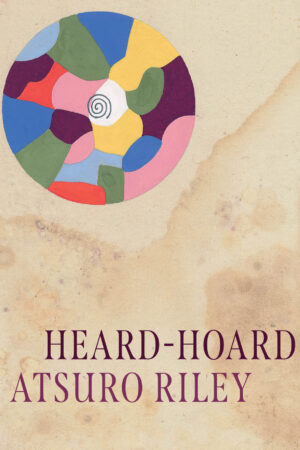The High Art of the Lowcountry: Atsuro Riley’s Heard-Hoard Revisited
by Patrick Davis
In “A Consideration of Poetry,” Kay Ryan writes, “We just feel that something precise is something important.” Atsuro Riley is among our most important contemporary poets because he is among our most precise. Riley’s meticulous phrasing, finely wrought syntax, and attunement to the peculiarities of rural speech make his most recent collection, 2021’s Heard-Hoard, “something important,” and a work deserving of a backward glance. The poems of Heard-Hoard make it abundantly clear why Riley has just received a Guggenheim Fellowship and the Award in Literature from the American Academy of Arts and Letters.
Much like his celebrated first collection, Romey’s Order (2010), Heard-Hoard is dedicated to conjuring a place and its people. Riley’s South Carolina lowcountry is peopled with figures drawn from his early life, and, like Marianne Moore’s “imaginary gardens with real toads in them,” the world he builds is precise. Deftly interwoven lines from the works of Emily Dickinson, Elizabeth Bishop, Gerard Manley Hopkins, and Seamus Heaney, plus the vernacular in which he was immersed as a child, make his imaginary garden of the Deep South feel real. His garden is a “quaggy / crample-ground. // Of briar-canes ( intervolved with kudzu-mesh ),” a place where “convoluted vines” are “gnawed by need on hands and knees.” His “toads” are often snakes—bandy snakes, blacksnakes, bull snakes, copperheads, cottonmouths, diamondbacks—which signal danger in the fallen world of his poetry.
Heard-Hoard is about what Atsuro Riley has heard, read, and then chosen from the great “word-hoard” accessible to him. The title refers to the origins of the English language, to the natural language of rural people, and to the beautifully broken and delicately woven English of Riley’s Japanese mother. His often-hyphenated word choices pay homage to the language he grew up with, a word-weave that speaks to language’s potential and its inadequacies. The poems are riddled with compound nouns, verbs, adjectives, and adverbs, endlessly modified in search of the exact word, even when it may not exist yet.
Heard-Hoard is as much about hearing the world as it is about writing it into existence. These two poetic acts are inseparable for Riley. Heard-Hoard opens with “Crackler,” an ars poetica:
What came to seem to him the core
( the pulsing core )
is wefted, warped: a lit
meat-mesh of heardsWhat tales he’d gnawed like seeds like sparks
Live ember-words( lucernal core )
— red ( gold ) filaments sing and thrum
In alive, glowing, warming words (the “lucernal core”), Riley’s poetic language shines a “lamp that lamped our night our dirt,” bringing out of the shadows those lives shaped by poverty and war (“Call”).
In “Element,” Johnny Pep, an isolated POW “( shrapped home from war ),” plaits a rudimentary house “from limbs and leaves.” The “strayboys” who help him are allowed “to taste ( to read ) to mull the grain” of “the shagbark bark” Johnny strips and shaves. Riley shows us that rough-hewn nature can itself be a language, a set of “rudimental stories” (“Creekthroat”) to be rolled in the mouth, parsed in the mind, worked by hand on the page, and woven into poetry.
Nowhere is Riley’s mastery more evident than in the long poem “Goldhound.” In a section subtitled “[ instrumental ],” the speaker asks: “Why does the swimhole marsh-meander sound like drums like guns like thunder. / Why this particular articulate pulse.” The smallest differences in guttural “ums” and “uns” is paired with the “art” linking “ic,” “ul,” “lar,” and “late.” Riley’s meticulous diction sounds natural and nuanced. As in “Creekthroat,” he focuses on the tiniest “radicle” of potential in language. Riley delves even deeper into the entangled roots of words in another section, “[ cottage-work ]”:
And there behind GreenHaven the Myrtises
will sell you a word.For curse or for cure
or they’ll salt some through your letters.
Riley shows what subtle shifts in spelling can do to a life—the removal of an “s” transforms a “curse” into a “cure.” Nothing in Riley’s work is accidental, not a single letter (like “e” and “c” in the line, “fine-carving these pine-paddles … Known to sear or scar”), not one moment of “Pausing and voweling.”
Among Riley’s most poignant poems is “Duet,” a song of commoners, comparable to the Greek stasimon. It reveals what’s at stake in the search for an adequate, authentic, precise voice. And it answers the question of why poetry matters, even in places where it may not be taught or recognized when spoken plainly:
Had we voice !
a voice
a braid-reed voice
our good throats restored
( our lockstitch chord )
We would
croodle-keen
( could breathe )
our lodged our
locked unsaids –
Duet our not-thought knowns –
Poetry, for Riley, is humanity’s saving grace, the ladder out of the dirt. To have a voice is to be able to tell one’s own story. It makes Riley’s world painfully real yet somehow bearable. In “Poetry,” Marianne Moore admonishes us to look to “the raw material of poetry.” The raw material of poetry is precisely what Atsuro Riley turns to, celebrates, and creates in Heard-Hoard. His recent accolades as a poet are a welcome reason to revisit this collection.
Published on August 25, 2023

